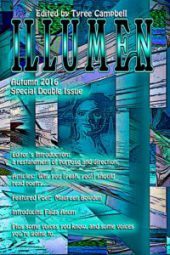It Begins With Sound in Fall Illumen, Issue Received
The Autumn issue of ILLUMEN, received with Friday’s street mail, brings a new policy along with essays by poet and artist Marge Simon and by me. As Editor Tyree Campbell explains, the focus remains on poetry, obviously. But beginning with this current issue, in addition to poems, art, and articles, I’ll present writings addressed to readers, inviting them into — or further into — the joys and sorrows of reading poetry. I firmly believe that one reason folks avoid poetry, or at best  tolerate it, is that they don’t understand it, or are afraid they won’t understand it . . . a fear of being found out by their peers. . . . A failed understanding, he goes on to suggest, that he feels may be nurtured by the way poetry is introduced to schoolchildren, as early as the third or fourth grade.
tolerate it, is that they don’t understand it, or are afraid they won’t understand it . . . a fear of being found out by their peers. . . . A failed understanding, he goes on to suggest, that he feels may be nurtured by the way poetry is introduced to schoolchildren, as early as the third or fourth grade.
And so, now there will be a series of essays written by poets themselves to, as he continues, “demystify” poetry, some addressed to more experienced readers, some intended to reach a younger audience. These essays will present the case for poetry; that answer The Question: Why should I read poetry?
I was one poet Tyree reached out to for a possible essay (see October 8, August 31), Marge Simon — who also is a previous editor of the Science Fiction Poetry Association’s STAR*LINE — another, and so we are both featured in this issue. Tyree bats first, ending his editorial with a short reflection on reading and language, then Marge with “Illuminating Poetry: Why Bother” on how we may “know” poetry more than we thought, with examples from her own work on how it can speak to certain classes of readers, children, lovers, lovers betrayed, or mothers and sons. Then, finally, my essay “It Begins With the Sound” recommends reading poetry aloud, reveling in the sound of the words and how they can amplify the meaning, and ends with two poems of mine, “Metal Vamp” with dancing and jazz (plus a review from STAR*LINE by Daniel C. Smith) and “La Méduse” (also, to give a quick plug, the foreword to my collection THE TEARS OF ISIS) with its series of s-sounds to, hopefully, echo the serpents that make up its subject’s hair.





